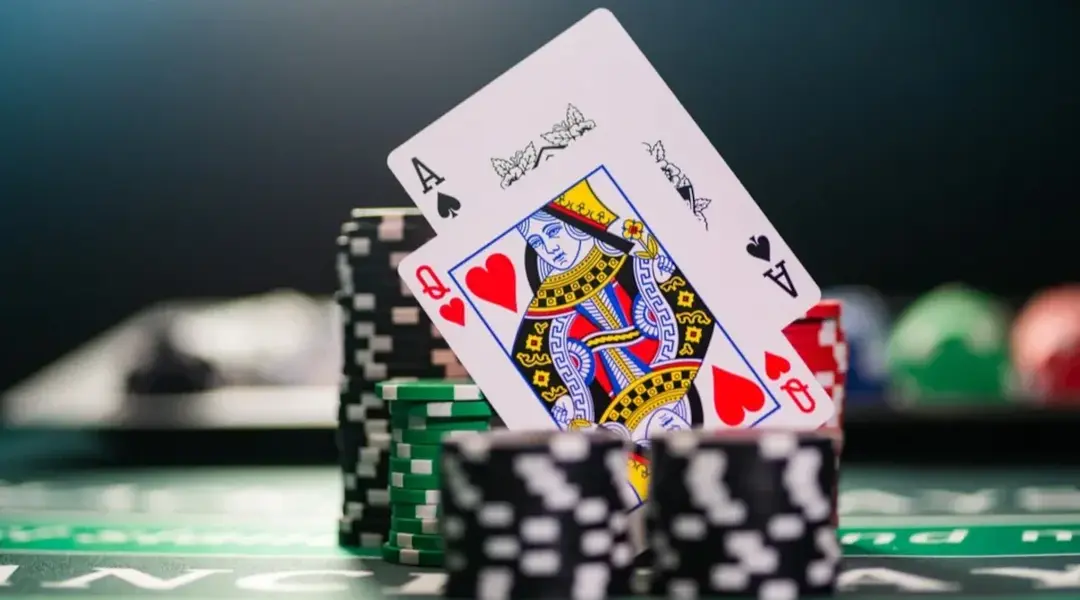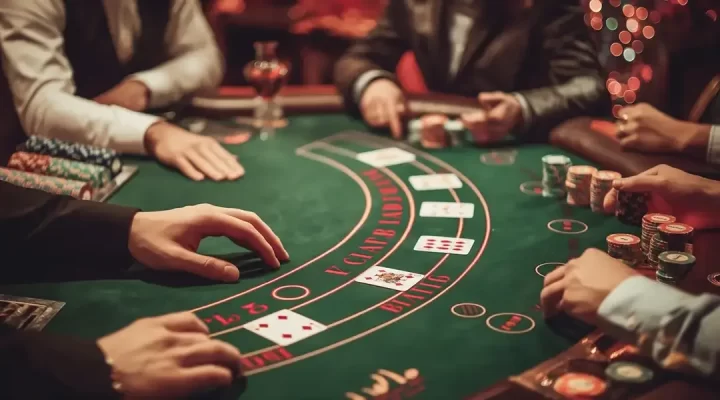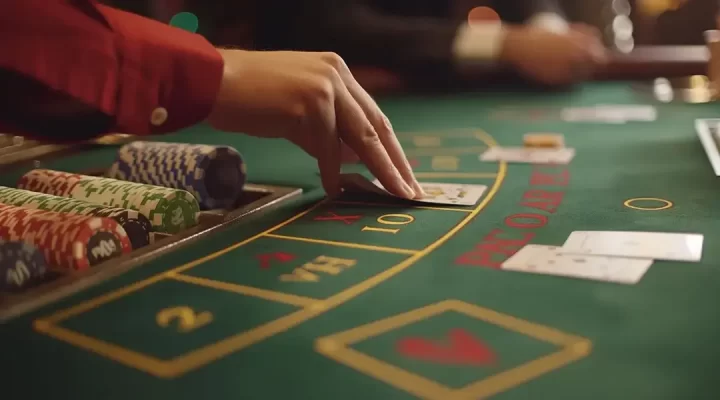Doubling Down in Blackjack: Mastering Your Winnings

For those seeking to enhance their blackjack strategy, understanding how doubling down works can provide a powerful edge. But what does double down in blackjack mean, exactly? At its core, doubling down allows players to make an additional wager for the opportunity to significantly boost their payout, adding a layer of strategy that can turn a simple hand into a potentially lucrative opportunity. Just as in popular games like the Lucky 88 Slot, where well-timed bets can amplify rewards, doubling down in blackjack requires smart timing to maximize returns. This in-depth guide will explore what doubling in blackjack entails, explain when to double in blackjack, and break down key data that reinforces this strategy’s value.
What is Doubling in Blackjack?
In blackjack, doubling down is an option that allows players to double their original bet after receiving their first two cards. However, this move comes with a stipulation: players may only receive one additional card to complete their hand. This means that while doubling down increases the potential payout, it also intensifies the risk factor since players are locked into just one more card without the option to hit again.
For instance, if a player initially wagers $20 and chooses to double down, they place an additional $20 bet for a total of $40. After receiving one more card, the player cannot hit again, making the decision to double down a strategic calculation that must be carefully considered.
How Does Double Work in Blackjack?

To answer the question of how does double work in blackjack, it’s essential to understand when and why this option is most advantageous. Generally, players will want to double down when their starting hand is strong against the dealer’s upcard. Basic strategy tables, used by many blackjack professionals, indicate ideal doubling down conditions based on statistical probabilities that consider the player’s hand against the dealer’s exposed card. For example:
- Player hand totaling 10 or 11: Doubling down on a 10 or 11 offers one of the highest probabilities of resulting in a winning hand, particularly if the dealer shows a lower card, such as a 5 or 6. In fact, doubling on an 11 can yield a win approximately 64% of the time when the dealer is showing a low-value card.
- Soft 16 to 18 hands: Doubling down on soft totals, like an Ace-5 (soft 16), can also be beneficial when the dealer shows a weaker card. Players often capitalize on soft hands since the presence of an Ace offers flexibility, allowing the total to adjust to avoid busting.
What Does Double Down in Blackjack Mean?
The significance of doubling down in blackjack lies in the balance of calculated risk with potential reward. By choosing to double down, a player stakes more on the belief that their hand has a high probability of beating the dealer’s, thanks to probability theory backing their decision. The concept of “what does double down in blackjack mean” is not just about increasing the bet; it’s about capitalizing on a favorable situation based on the cards in play. Statistically, the move is less favorable against certain dealer cards:
- Against a Dealer 7 or higher: Doubling down becomes riskier when the dealer shows a strong card like 7 or above. In these cases, hitting instead of doubling often has better outcomes, especially if the player’s hand totals less than 10.
- Avoiding doubles on low hands: Doubling down on hands totaling less than 9 is generally avoided since the likelihood of reaching a competitive hand is statistically lower.
When to Double in Blackjack: Key Scenarios
Knowing when to double in blackjack can transform an average game into a profitable one. Timing, paired with an understanding of hand probabilities and volatility, helps optimize this move. Volatility in blackjack refers to the variability in winning and losing streaks, and knowing how to leverage it can make doubling down especially effective in the right scenarios. Key doubling down scenarios include:
- Doubling on a 10 against a Dealer’s 9 or Less
This is considered one of the strongest doubling scenarios. A starting total of 10 offers the player a good chance to land a card worth 10, creating a solid 20. Against a dealer’s 9, players have a 55% chance of winning, making it an opportune moment to maximize the bet. - Doubling on an 11 Against Any Dealer Card (Except Ace)
An 11 is regarded as the best possible hand to double on, as players only need one 10-value card to reach 21, statistically outpacing most dealer outcomes. For instance, data shows that players win approximately 65% of the time when doubling on an 11 against a dealer showing a card between 2 and 10. - Soft Hands: Doubling on Soft 16, 17, or 18 Against a Dealer’s 4, 5, or 6
A soft hand, such as an Ace-6 (soft 17), benefits greatly from doubling down in this scenario, especially when the dealer shows weak cards. The soft hand reduces the bust risk, and hitting a 10-value card on a soft 17, for example, brings the total to a robust 21. - Doubling Against a Weak Dealer Card (5 or 6)
When the dealer reveals a low card, such as 5 or 6, it’s often a strategic moment to double on totals like 9, 10, or 11. A dealer’s 5 or 6 is statistically the weakest card, resulting in busts around 42% of the time, so players can take advantage by doubling down with higher chances of winning.
The Risk Factor: When Not to Double Down

While doubling down has its advantages, there are times when it’s better to avoid this option. For instance, doubling down against a dealer’s Ace, especially when the player has a hand like 8 or 9, isn’t favorable since the dealer has a higher chance of reaching a strong hand. Moreover, doubling on hard hands below 8 generally decreases the likelihood of reaching a competitive total and increases the risk of losing both the initial and doubled bets.
Success Rates and Expected Returns
While every blackjack game and hand is unique, doubling down when the player holds a 10 or 11 is often the most successful, with a win rate reaching upwards of 60% under favorable conditions. Expected returns vary based on the specific hand and dealer card, but on average, a well-timed double can yield approximately a 20% higher payout compared to a single bet. For example:
- Doubling down on a hard 10 against a dealer’s 9 yields a 55% win rate.
- Doubling down on soft 16 against a dealer’s 5 shows a win rate of around 58%.
Understanding the Math Behind Doubling Down
The mathematics of doubling in blackjack relies heavily on probability theory and the use of RNG (Random Number Generator) in digital games, ensuring that card draws are truly random. The game’s structure, in which players face off against the dealer’s potential busts, provides opportunities to capitalize on weak dealer hands. Based on a standard deck, the probability of drawing a card valued at 10 is roughly 31%, a factor that drives the doubling strategy’s effectiveness. Additionally, understanding the concept of volatility in blackjack helps players manage risk, as higher volatility means greater swings in winning and losing streaks.
In conclusion, the answer to “how does double work in blackjack” and “when to double blackjack” ultimately boils down to maximizing returns on favorable hands. Knowing what is doubling in blackjack can empower players to make better decisions, increasing their odds of a successful game. While no strategy guarantees a win every time, doubling down—when done wisely—remains a cornerstone of skilled blackjack play.